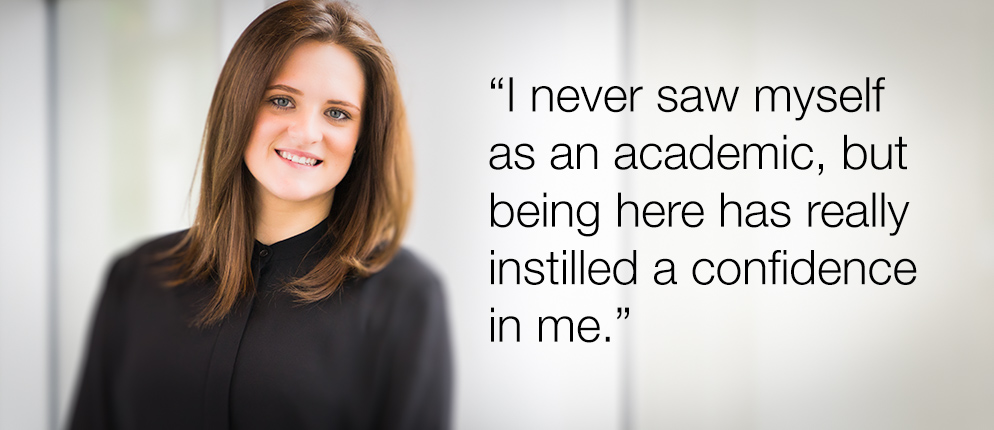- Future Students
- Current Students
- Faculty
- Staff
- Alumni
- Others
Psychology student to present paper at national conference

This June, most students from the University of Guelph-Humber will be enjoying a well-deserved break after months of schoolwork. But Maggie Stein, a 3rd-year Psychology student, will be preparing to present her work to the biggest names in her field. From June 9-11, Maggie will be at the Canadian Psychological Association’s annual conference in Victoria, BC, talking about a research paper she wrote here on campus.
It’s a rare opportunity for an undergraduate student to present nationally, and it’s come as a surprise to Maggie most of all.
“I’m nervous,” she says. “This feels like a big challenge and I never saw myself doing this, but it’s an opportunity.”
The story of how Maggie wrote her paper begins far to the north in the upper reaches of Ontario, near the shores of James Bay. Maggie was taking part in the field study course that Dr. David Danto, program head of Psychology, led to northern Ontario, which teaches students about the mental health related to Indigenous peoples living in Canada, especially those in rural locations.
The group flew to Cochrane, and then travelled by train to Moosonee where they got acquainted with the town, which has a large Cree population. They met social workers and psychologists, Elders and then visited the local probation and parole office. When Maggie, an avid soccer player learned that the local community gathered to play soccer one night each week, she knew she had to go take part.
Though she arrived too late to play, as Maggie stood and watched, she started to develop an idea for a research paper. It churned around in her head the rest of the trip as they flew by helicopter to Moose Factory, trekked back to Toronto, and eventually Maggie wrote a paper about sports and their intersection with the medicine wheel.
“In my paper I proposed that instead of trying to get Aboriginal youth to play westernized sports, we should be equipping them to play sports that are culturally-relevant. If we encourage them to take part in things that they care about and connect them to their culture, they’re more likely to take part and see its benefits,” Maggie says. “I framed that argument within the premise of the medicine wheel. You have to tend to the physical, mental, spiritual and emotional because they play off of one another. You can’t be healthy if you’re just physically fit.”
With some encouragement from Dr. Danto, Maggie submitted her paper to the CPA conference and was accepted. It was the nudge she needed to take on the other research challenges she’d been hoping for. Already, Maggie is preparing to write her honours thesis on the approaches brought by western psychologists versus those who are trained to work in Aboriginal mental health, and she’s also considering a research Master’s related to this field.
“Being in Moosonee taught me that when you’re inserting yourself into someone else’s culture, you need to have the wisdom to accept how little you know,” she says. “Don’t pretend you know, ask questions and admit you have no idea.”
For now though, Maggie is preparing for the conference this summer.
“I never saw myself as an academic,” she says. “I never would have been able to do this without all of the support and encouragement I receive here at UofGH. I wouldn’t try what I try without it. Being here has really instilled a confidence in me.”
Learn more about Psychology at UofGH.

